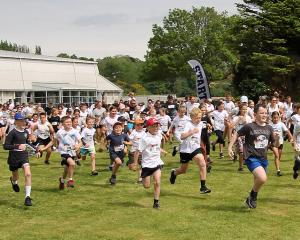Prof Howden-Chapman, of the university's Wellington campus, was delighted to receive the top award and to become the first woman research leader and first social scientist to receive it.
She paid tribute to her ''fantastic'' Wellington-based team whose members worked collaboratively at Otago University's Wellington campus.
She reflected on weekly ''muffin meetings'', which had featured strongly multidisciplinary input.
The 28-member He Kainga Oranga/Housing and Health Research Programme's research over more than 15 years has involved thousands of New Zealanders and informed policy developments for successive New Zealand governments.
''We've gone on a long journey together - they find it very rewarding to be doing research that directly improves people's lives,'' she said.
This is the second time Otago University researchers have won the top Prime Minister's Science Prize since it was established in 2009.
The Dunedin based Centre for Chemical and Physical Oceanography, co-directed by Prof Keith Hunter, won in 2011.
Prof Howden-Chapman praised the broad support which the housing research programme had gained over the years, including funding from the Health Research Council.
The research team will use $400,000 of the prize money to carry out a community trial on the impact of improving housing on newborn infants.
The prizes were presented to winners yesterday at the Museum of New Zealand, Te Papa Tongarewa, in Wellington.
Recently appointed Otago University physiology lecturer Dr Karl Iremonger was awarded the MacDiarmid emerging scientist prize at the same ceremony, recognising his innovative research, which has included discovering a new brain cell structure and communication system.
This prize involved the second largest amount of funding, $200,000.
Otago University vice-chancellor Prof Harlene Hayne congratulated both winners, saying the prize gained by the housing and health team had recognised ''transformational science'' that had a significant impact in New Zealand or internationally.
University officials said the Wellington team had worked nationally to address long-standing quality deficiencies in housing, particularly as they affect vulnerable groups such as children, older people, and those with chronic health conditions.
The team had also monitored reductions in hospitalisation rates when low-income families moved from being private sector tenants to renting a state house.
Prof Howden-Chapman said she was motivated to establish the team by concern about growing inequality in New Zealand and the desire to do something practical to improve New Zealanders' health and wellbeing.
Dr Carlos Dora, a senior World Health Organisation official, said Prof Howden-Chapman and her team were ''global leaders'' in research involving effective healthy housing intervention and a source of evidence and inspiration for healthy built environments.
Award officials said Dr Iremonger's work was setting the stage for more targeted therapies for neurological diseases.
Of his overall prize, $150,000 will fund further research. He focused his research on specific brain cells that controlled fertility and reproduction and said his work could ultimately lead to improved contraception and infertility treatments.
The award provided a ''fantastic start'' to his efforts to set up his own state-of-the-art research laboratory in the Otago physiology department.
Dr Iremonger leads a team within Otago's Centre for Neuroendocrinology, the largest research cluster of its kind in the southern hemisphere.
Other awards: Science teacher prize, $150,000, Terry Burrell, Onslow College, Wellington; future scientist prize, $50,000 tertiary scholarship, Tim Logan (17), of Darfield High School, Canterbury; science media communication prize, $100,000, Dr Michelle Dickinson, Auckland University.












